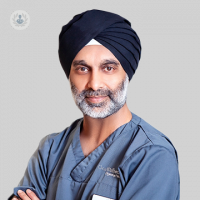Nothing to lose? The benefits of innovative new weight loss treatment ESG
Written by:Bariatric surgery for weight loss, more specifically laparoscopic sleeve gastrectomy (LSG), can have significant benefits to your quality of life, but this technique’s invasive nature comes with complications such as bleeding and leakage.
Award-winning gastroenterologist Dr Devinder Bansi discusses how a newer, less-invasive procedure called endoscopic sleeve gastroplasty (ESG), is being introduced into his surgical practise. Read on to find out more.

What is endoscopic sleeve gastroscopy (ESG)?
For the ESG procedure, a special tool is inserted into the stomach via your throat. This tool stitches the stomach wall together to make it smaller, using sutures.
It’s reduced in size by around two-thirds, which is around the size of a large banana. It’s carried out using general anaesthetic.
The sutures are made of a non-absorbable nylon-based material that’s resistant to stomach acid, and remain there indefinitely.
After the operation, patients can return to work within four days.
What are the benefits of ESG?
The consequences of obesity can be heart disease, diabetes, strokes and wear and tear in bones and muscles, resulting in hip and knee replacements.
Patients who have this procedure can lose up to 20 per cent of their body weight, which is three stone on average. Some people may lose more.
Weight loss of ten per cent is enough to improve diabetes control and protect against:
- Heart disease
- Stroke
- Arthritis
- Acid reflux
- Sleep apnoea
Is the difference between LSG and ESG procedure also beneficial?
With LSG, the stomach is cut and stitched in a way that it becomes a tube. While it reduces stomach volume and shrinks the appetite, one in ten LSG patients become unable to absorb essential nutrients and become reliant on lifelong vitamin injections.
With ESG, the stomach isn’t cut so this complication is avoided, and there are no scars.
Are there any cons to the ESG operation?
Endoscopic sleeve gastroplasty is ineffective in about 20 per cent of patients, like all weight-loss surgery. Despite this, a recent study found more than half of patients have been able to maintain their weight loss five years after the operation.
After the operation, appetite is reduced. Due to this, patients are warned that if they eat too much, the stitches can become loose and the stomach returns to its original size.
Do you have an ESG patient success story?
Businessperson Anita Larson (53) stopped exercising after suffering a spine problem. This led to her relying on steroid doses for the pain but she gained weight as a result.
She said: “I tried every diet going, but nothing worked. I just couldn’t shift the weight.”
After being one of Dr Bansi’s first patients to undergo this procedure in February last year, she lost five stone.
She acknowledges that if she ate badly, it wouldn’t work. It’s important to consider nutrition: “It’s not a magic wand.”
She added: “But I don't get cravings, I'm not as hungry and after three mouthfuls I'm full. The weight has steadily gone down, even in lockdown.”
If you’re interested in endoscopic sleeve gastroplasty, Dr Bansi is offering the operation at BUPA Cromwell Hospital. To arrange a consultation with this leading gastroenterologist, visit his Top Doctors profile.


